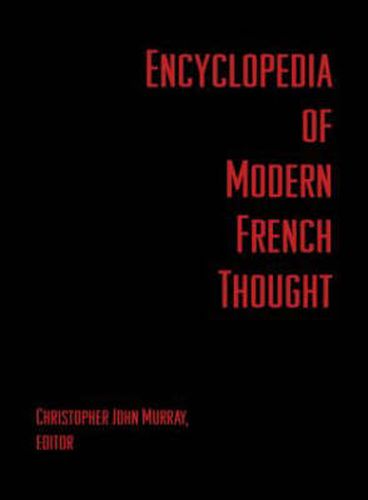Readings Newsletter
Become a Readings Member to make your shopping experience even easier.
Sign in or sign up for free!
You’re not far away from qualifying for FREE standard shipping within Australia
You’ve qualified for FREE standard shipping within Australia
The cart is loading…






This wide-ranging guide to twentieth-century French thought reflects current research, including all of the major disciplines, such as philosophy, literary theory, sociology, linguistics, political thought, and theology. The Encyclopedias’s approximately 240 entries fall into two categories: those on individuals (which make up the bulk of the book) and those on themes, concepts, and historical background. The entries on individuals provide a clear and informative account of a thinker’s ideas, influence, and critical reception. The articles also emphasize the relationship between such ideas and the social, historical, and cultural life of modern France, and each includes a separate paragraph of biographical information, a list of selected works, and suggestions for further reading. The more thematic entries cover specific disciplines, such as anthropology, historiography, and psychology; theories, beliefs and methodologies, such as Catholicism, feminism, and Marxism; the arts; historical, political, social, and intellectual context; and other key subjects, such as freedom, language, media, and society. The Encyclopedia also contains a detailed chronology, identifying key intellectual, literary, cultural, and historical events, largely French but with international counterpoints. Adamowicz, Elza. Department of French, Queen Mary, University of London, UK. Adamson, Kay. Glasgow Caledonian University, UK. Afilalo, Ari. Department of Law, Rutgers University, New Jersey.
$9.00 standard shipping within Australia
FREE standard shipping within Australia for orders over $100.00
Express & International shipping calculated at checkout
This wide-ranging guide to twentieth-century French thought reflects current research, including all of the major disciplines, such as philosophy, literary theory, sociology, linguistics, political thought, and theology. The Encyclopedias’s approximately 240 entries fall into two categories: those on individuals (which make up the bulk of the book) and those on themes, concepts, and historical background. The entries on individuals provide a clear and informative account of a thinker’s ideas, influence, and critical reception. The articles also emphasize the relationship between such ideas and the social, historical, and cultural life of modern France, and each includes a separate paragraph of biographical information, a list of selected works, and suggestions for further reading. The more thematic entries cover specific disciplines, such as anthropology, historiography, and psychology; theories, beliefs and methodologies, such as Catholicism, feminism, and Marxism; the arts; historical, political, social, and intellectual context; and other key subjects, such as freedom, language, media, and society. The Encyclopedia also contains a detailed chronology, identifying key intellectual, literary, cultural, and historical events, largely French but with international counterpoints. Adamowicz, Elza. Department of French, Queen Mary, University of London, UK. Adamson, Kay. Glasgow Caledonian University, UK. Afilalo, Ari. Department of Law, Rutgers University, New Jersey.